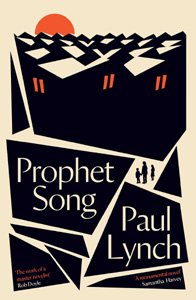There's a long tradition of literature that vividly shows how the liberties of citizens can be systematically stripped away by totalitarian governments. From Orwell's “1984” to Yevgeny Zamyatin's “We” to Atwood's “The Handmaid's Tale”, these dystopian stories pinpoint the way that language and technology are used to manipulate the public into obedience and complicity. It's something every society must be continuously vigilant about because the designation of power in any form of government will always give rise to some form of abuse and corruption. Now there is a powerful new modern novel which stands alongside these classics. Paul Lynch's “Prophet Song” details a nightmarish fictional version of Ireland where increasingly draconian laws and policies lead to the suppression of all personal freedom and the disappearance of individuals designated as potential dissidents. It focuses on the point of view of Eilish who is a scientist, wife and mother of four. When her husband comes under scrutiny and restrictions increase her life and community gradually unravel in an alarming way. It's a harrowing story which grows increasingly gripping and acquires more contemporary relevance as Eilish's reality spirals out of control.
At first the style of this novel might seem unnecessarily confusing because quotation marks aren't used in the dialogue. It also blends any speech into the overall narrative to create big chunks of text. However, it's usually clear who is speaking and, as the story progresses, this form takes on more significance as it adds to Eilish's sense of claustrophobia and chaos. Eventually the crowded narrative comes to feel like a stream that cannot be stopped and it becomes oddly hypnotic. As a busy individual trying to balance a demanding job on top of caring for her four children and a father struggling with dementia, much of her life is composed of the chores and small details in her day to day existence. There's little time for taking a stand against the government or working to preserve her liberties. The oppressive system relies on this and gradually strips away her autonomy. Of course, she raises her voice when obvious illegalities are turned into policy but if the government disappears those who violently object to it or remains mute there can be no recourse. It's observed at one point that “they take something from you and replace it with silence and you're confronted by that silence every waking moment and cannot live, you cease to be yourself and become a thing before this silence”. A sense of dread increases as the story goes on, but nothing can be done as normal checks and balances fail and her circumstances become dire.
I sympathised with Eilish's sense of helplessness when faced with a larger system that feels like it can't be changed or even questioned. I encounter this issue on varying scales from my work to my community to the government of my country. It's a constant process of negotiation about how much I'm willing to take a stand when falling into line is much easier or might even be the only option given other obligations. However, alongside this strong message about the individual being caught in larger systems, this novel also movingly represents changes in personal relationships over time. Eilish's 12 year old son Bailey is at a precarious stage in life and when the authoritarian pressures increase his development is affected. There's a striking scene where Eilish is challenged by this son. She can simultaneously see him as a boy and as a growing man. This is something anyone who has known an adolescent will understand. It's impressive the way the novel captures these in-between stages where individuals inhabit multiplicities that are warped by the stress of living under oppressive circumstances.
Though this story is set in a nebulous alternative present or possible future in Ireland, it also feels like it draws upon real elements of history. Aspects of the plot resembled the recent novel “Black Butterflies” which so vividly describes the Siege of Sarajevo from the inside and other parts of the novel reminded me of the people who went “missing” during Argentina's “Dirty War”. However, it also comments on the international reaction to strife and warfare occurring within a particular country. At one point Eilish's daughter comments “They are calling it an insurgency on the international news, Molly says, but if you want to give war its proper name, call it entertainment, we are now TV for the rest of the world.” As the book progressed, it made me think more and more of the war on Ukraine which came to dominate the news in 2022 though the conflict had really been going on for many years prior as described in the memoir “The Death of a Soldier Told by His Sister”. In these ways, it felt like this novel speaks to our present day as well as potential dark paths our society might take in the future.
“Prophet Song” is certainly an unsettling read, but it never feels too dreary because of the elegant use of language. Paul Lynch conjures images of startling beauty in short descriptions of the environment such as a pond where there is “a swan gliding whitely through wrinkles of sun”. Of course, the potency of this verbiage also intensifies scenes of horror. It's particularly effective when things occur rapidly during a catastrophic event. It's very challenging to convey this on the page but Lynch does an impressive job of dramatically representing that experience. Both the psychology of the characters and the physical details being portrayed feel so realistic in these moments. Overall, there are many memorable scenes in this book and impactful ideas. These make this novel such an arresting read which also leaves a lasting impression.








